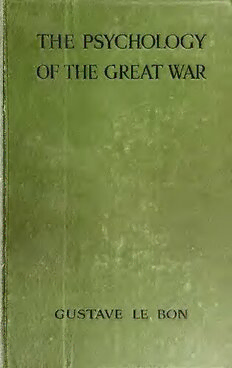
The Psychology of the Great War PDF
Preview The Psychology of the Great War
i' ':';": THE PSYCHOLOGY WAR OF THE GREAT GUSTAVE BON LE 1 CORNELL UNIVERSITY LIBRARY BOUGHT WITH THE INCOME OF THE SAGE ENDOWMENT FUND GIVEN IN 1891 BY HENRY WILLIAMS SAGE Date Due MAR 2 2 Cornell University Library The original of this book is in the Cornell University Library. There are no known copyright restrictions in the United States on the use of the text. http://www.archive.org/details/cu31924027857014 THE PSYCHOLOGY OF THE GREAT WAR THE PSYCHOLOGY THE GREAT WAR of BY GUSTAVE LE BON TRANSLATED BY E. ANDREWS NEW YORK THE MACMILLAN COMPANY 1916 (All rights reserved) PREFACE TO THE ENGLISH EDITION One of the plainest lessons taught by history, and one of those most substantially verified by the present war, is that nations are not ruled by realities, but by the more or less illusory ideas which they form of these realities The truth about . an historical event may be revealed fifty years after it has taken place, but is seldom known at the time of its occurrence. The origins of the European War are a fresh justification of this theory, for the Germans are firmly convinced that the conflict is due to a con- spiracy secretly plotted by England, and yet England, as a perusal of the diplomatic corre- spondence shows us, was eminently desirous of peace, and until the very last moment made the most desperate efforts to preserve it. At no period of her history had England been so ill-prepared for war, and never had she so wished to avoid it at any price. Her parliamentary dissensions and the civil war which threatened her in Ireland were enough to make her statesmen relinquish any bellicose desires which they might have cherished, but, nevertheless, they were induced to take up the gauntlet. The mental differences which divide the various nations are so deep-seated that it is very difficult for them to understand the motives of one another's S — . Preface to the English Edition conduct. Legal theorists in Germany are so con- temptuous of treaties that the idea of a nation embarking upon hostilities merely because it con- sidered itself bound as a signatory, could never enter their minds. No Teutonic statesman could understand that any one would make war for such a reason, and to the German nation it was even less intelligible. This is why the present struggle is a conflict of principles even more than of interests. The ques- tion is whether the conquests which it has taken civilization so long to secure, and which are the foundations of social and international life, must disappear for ever. If the Teutons are to win brute force alone will reign over the world and none of our former moral laws will be respected. But Germany will never prevail until the last Briton has perished. The English people have — been slow too slow, as their Allies may think in adapting themselves to the exigencies of modern warfare ; but their adjustment is now complete The change was more difficult for England than for the other nations, because she was obliged to relinquish her time-honoured traditions of liberty, to adopt universal compulsory military service, for which she had an intense dislike, and to renounce her commercial freedom in order to militarize her industry. She has had to do many other things besides ; but it is all over now. England has been slow, but she is ready to-day, and with what crush- ing weight her puissant might will press upon Germany's destiny the Teutonic Empire will hence- forth know to its cost. 6
